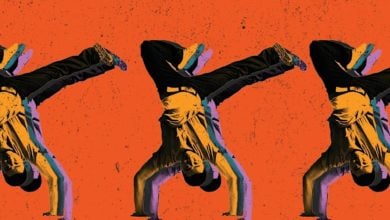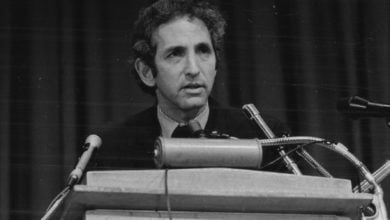“Adios al Rey de Pop” read the online headline of El País the day following Michael Jackson’s death. Jackson’s international acclaim—underscored by the vigils that took place in nearly every country on the planet and a viral video of 1,500 Filipino prisoners re-enacting the “Thriller” video—is well documented. He sold over 750 million albums in his lifetime, including “Thriller,” the world’s bestselling album of all time.
|
Jackson’s unprecedented popularity in itself makes him more than an entertainer. He is a cultural and historical figure that Marxists must examine and understand. He touched many a raw nerve in U.S. society in his lifetime. His alleged experience with child abuse, his seeming rejection of his physical Black heritage, and his own battles in court exposed fault lines that continue to resonate powerfully.
Born into a working-class family
Michael Jackson was born the seventh of nine children to Joseph and Katherine Jackson, in Gary, Ind., the “Magic City of Steel.” Joe Jackson had been part of a failed singing group and worked for U.S. Steel. He was determined his children would pick up where he left off and enjoy a standard of living he had never been able to achieve.
While many often lament (rightfully) the decline of industrial working-class jobs—because they offered comparatively better wages and benefits than today’s service-dominated economy—we often forget the long hours and oppressive conditions tied to these jobs. Black workers were relegated to the most dangerous jobs such as those in the coke plant, where one false move with the coal shovel or at the ultra-hot blast furnaces meant severe injury or death.
Joe Jackson is now notorious for being “hard” and strictly regimenting his children’s lives so they constantly honed their musical skills. Michael was clearly the star of the Jackson 5, which began playing in local Gary venues, although the youngest in the group. Fate smiled on the Jacksons when they were introduced to Motown founder Berry Gordy. Motown was then the premier Black business in the United States and one of the world’s most successful record companies.
Gordy, a former Detroit autoworker, founded the company in 1959 and through the 1960s built his small label into an industry powerhouse. Motown’s success was predicated on its ability to translate the soulful music of the northern ghettos—rhythm and blues—to white audiences. Motown became the ultimate “crossover” or pop label.
This development did not arise out of thin air. Cab Calloway, Louis Armstrong and Duke Ellington gained national prominence in the 1920s. Miles Davis, Charlie Parker and others likewise reached wide audiences of whites and Blacks. However, this crossover appeal was limited by racism. Like many other Black-led cultural art forms, jazz was associated with crime, particularly drug use and “illicit” sex.
In the 1950s, Chuck Berry, a blues and country musician by trade, broke many barriers as an originator of rock-and-roll guitar. But the genre became a true crossover sensation due to Elvis Presley and Jerry Lee Lewis, who drew heavily from Black artists like Little Richard, Fats Domino and others. The Memphis-based Sun Records repackaged the music with white faces—not giving due credit or payment to its originators—but white parents and religious leaders all across the country still derided it as “jungle music.”
Impact of Civil Rights Movement
By the late 1950s and early 1960s, the Civil Rights Movement had convulsed the country in a debate over the future of Jim Crow. The movement not only challenged formal segregation in the South but profoundly affected social relations nationwide, opening a wider debate about racism. As the Black freedom struggle bravely challenged the “common sense” of segregation, it called into question the sanctity of established authority as a whole, including the stultifying cultural and social norms associated with McCarthyism.
Berry Gordy was positioned both historically and geographically to take advantage of the new moment. He had a two-fold approach: first, to assemble all the best singing talent and producers in Detroit; and second, to avoid any sort of open political or social controversy. Feel-good, romantic lyrics and excellent instrumentation created friendly hits like “Dancing in the Street” (Martha and the Vandellas) and “Love I Can See” (The Temptations).
Gordy was able to take the magnetic soulfulness of Black rhythm-and-blues artists like Jackie Wilson or James Brown, and strip it of its open sexual or political themes. He put his artists through rigorous classes and trainings of all sorts to help them become “gentlemen and ladies” and polish their appearances for the Ed Sullivan Show, American Bandstand and AM radio (dominant in music until the 1970s).
This is the world Michael Jackson was swept up into in 1968. At 10 years old, Jackson became the central star in one of Motown’s soon-to-be signature groups. Not only was he out touring and recording from an early age, he was forced to lie about his age (younger was cuter for the Tiger Beat crowd) and force-fed answers to political questions from the media. Michael Jackson’s childhood was almost totally stage-managed and presented as the lovable cute center of a lovable family-friendly singing group.
The Jackson 5 quickly became a stalwart of the Motown hit machine running off a series of hits inspiring cartoons, coloring books, lunch boxes and every other conceivable commodity. The Jackson 5 had two television specials, numerous top-five and number- one hits on the Billboard charts.
As the center of the group, Michael Jackson came to loom large over the group as a whole. He had his first number-one solo hit in 1972 with “Ben.” However, as the 1970s progressed, the Jackson 5’s star faded. In 1975, the newly christened “Jacksons” moved to CBS records for a much better deal financially. They continued to record hits, but the Jackson 5 phenomenon had passed.
From child star to ’king of pop’
Michael, like so many other performers, had become accustomed to the constant adulation and was hard hit by these changes. His pubescent years, an already difficult period for most children, were subject to extreme scrutiny. Fans complained about his changing voice, and he began to despair about the changes brought by puberty. He was highly concerned with his appearance, particularly acne and what he viewed as a too wide nose.
The ranks of child stars are filled with hard luck stories of individuals who could not adjust to the pressures of adult stardom. Child stars are marketed for their lovable cuteness and innocence—a fetishized version of childhood—and as they change, they are chewed apart and often discarded as unmarketable. The rapid fall from stardom is emotionally devastating for adults, and is often even harder for young people who have no independent network of friends and family to fall back on.
Michael Jackson, however, was not discarded; although he had tremendous anxiety during this period, he was given a chance to return to the stage as a solo artist. Hooking up with producer Quincy Jones, he put out “Off the Wall” in 1979. “Off the Wall” and its title single drew from the disco craze and his R&B roots to produce an electric party record. Catapulted back into the public eye, Jackson recorded four number-one hits on the Billboard charts—the first album to ever accomplish that.
A perfectionist and workaholic, Jackson was unsatisfied and felt the album should have done better. The obviously racist music industry continued to snub Jackson despite his commercial success; he won a number of awards in the “Black music” category of Billboard.
‘Thriller’ changed music history
As they say in hip hop, Jackson went “back to the lab” and the concoction he brewed up in 1982, “Thriller,” changed music history and is perhaps the most iconic album in music history. Almost nothing needs to be said about “Thriller,” the highest selling album of all time. Jackson’s “Thriller” video, which was a mini-movie, was such a sensation that he became the first Black artist to receive regular rotation on the new MTV (Music Television), which had been an almost totally white rock-oriented channel.
The year following “Thriller,” Jackson appeared as the headliner of the 25th anniversary celebration of Motown, viewed by 47 million Americans. Jackson was the biggest star in attendance and he stole the show. Always an accomplished dancer, at Motown 25 Jackson debuted the “Moonwalk,” a move he had seen performed by street-corner dancers. While the move is almost a cliché now, at the time it astonished and amazed even the other Motown stars in attendance that night.
Upon Jackson’s death, world-famous dancer Mikhail Baryshnikov noted not only his signature moves, but his glide-like movements while performing. As a dancer alone, Jackson has left an indelible imprint on modern hip hop and popular culture.
Private anxieties about self-image
The other side of Jackson’s skyrocketing fame as a singer and dancer was his private anxieties about self-image. After “Thriller,” Jackson recorded the album “Bad.” The album cover shocked many fans; Jackson, who had always had light brown skin, appeared almost totally white, with long straight hair and an obvious nose job.
Jackson had suffered an injury in 1979 that led to his first nose job. Jackson claimed he had been diagnosed with lupus and the skin disease vitiligo, which made him sensitive to the sun and required him to bleach his skin. The truth will probably never be known, but Jackson’s appearance attracted quite a bit of tabloid attention.
Jackson’s apparent physical changes were compounded by a musical transformation, as “Bad” included heavy rock influences. At the urging of Jones, who always had an ear out for the newest trends, Jackson used the title track to try to reinvent himself with a grittier look, as opposed to the friendly next-door neighbor star.
While Jackson’s skin disease may have been real, looking back it’s obvious that his life was totally shaped by pop music. He was obsessed with his appearance and with achieving maximum acceptability. It seems fair to assume that his experience of losing many fans as a teenager made him obsess with his appearance. He hoped the mainstream would never again reject him; and because “mainstream” at least implies “white,” he pursued what he felt would be the ideal “popular” image.
Jackson and celebrity political trend
During this period, Jackson also set the tone for today’s generalized, and generally annoying, celebrity political trend. As the powerful social movements of the 1960s receded, the overtly political themes of mainstream music faded as well. In 1985, Jackson and Lionel Richie produced the song “We Are the World,” aimed at promoting famine relief. The song, which gathered a broad spectrum of luminaries from the entertainment field, was the first major foray of artists into world issues in quite some time. But unlike the 1960s, the song’s message and spirit was politically sanitized—a sort of “non-political” politics. It was politics that could be totally embraced by corporate America, the driver of pop music, and in fact utilized to improve imperialism’s image during the cold war.
There is a clear line from Jackson’s to Bono’s “humanitarian” efforts, which align with the “non-governmental” efforts of imperialist politicians like Tony Blair. Jackson cannot be personally blamed for this legacy, but his undefined humanism did boost a brand of international activism, such as today’s Save Darfur movement, which focuses on poorly explained “humanitarian crises” that obscure the predatory role of the U.S. and European governments.
“Bad” sold millions of copies but did not approach the commercial success of “Thriller.” This tremendously depressed Jackson who had unrealistic expectations of emerging an even bigger star than before. His last truly successful album came out in 1991 with “Dangerous.” While Jackson appeared physically whiter than ever, his music came back “Blacker,” in that it drew more heavily from his R&B roots.
Ending his relationship with Jones, Jackson collaborated most notably with Teddy Riley. Riley was the creator of New Jack Swing, which revolutionized R&B by bringing it closer together with hip hop.
“Remember the Time,” a major hit off the “Dangerous” album clearly exhibits this trend; his soulful ad-libs during the last minute of the song have since become iconic.
A fascination with eternal youth
In 1993, Jackson was hit with his first child sexual abuse charges. Jackson settled the case—which of course made him guilty in the eyes of many. As someone who had virtually no childhood himself, he appeared to develop a fascination with eternal youth. He built an estate called “Neverland,” where he had all sorts of child-oriented activities and invited hundreds of children, including many victims of terminal illnesses, to come and play at the ranch. Jackson was confronted with another child abuse charge in 2005—and was acquitted on all charges. It is worth noting that the fathers of the accusers in both cases were upset that Jackson would not help them advance their own careers.
This has become the defining mark to tarnish Jackson’s career. There is no evidence he ever abused any children—only unsubstantiated assertions. Nevertheless, Jackson became progressively more “strange” during the 1990s, as an almost total recluse who appeared in public only in costume and engaged in a series of marriages that appeared farcical. Although never convicted of any crime, in the “public eye”—which is itself a perception crafted by the corporate media—he became associated with criminality. Drawing on typical homophobic and sexist tropes, he was portrayed as a sexual deviant, whose fascination with children was equated with perverse activity.
Summing up his life
Looking back, Jackson’s life is largely a tragic story, despite his wealth and popularity. Pushed into the big- business machine of pop music, Jackson craved the love of millions of fans, and did whatever he could to make himself more palatable to them. Although his music resonated powerfully and personally with people the world over, he remained paradoxically detached from the world around him. He seemed totally unaware that most of his fans liked him as he was, and he underwent plastic surgeries and other treatments to match the view of what society deems beautiful: white skin, straight hair and a thin body.
Rather than condemn him, it is worth considering how entertainment under capitalism promotes ridiculous self-images and lowest-common-denominator entertainment. This is what trapped Michael Jackson in a self-destructive pattern, which ultimately destroyed him. However it has not destroyed his legacy. Adios al Rey de Pop.







